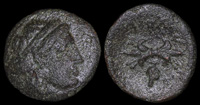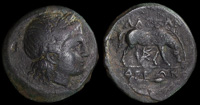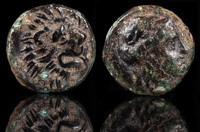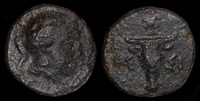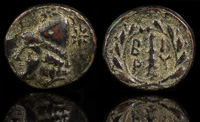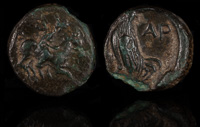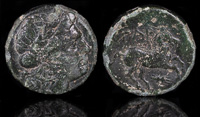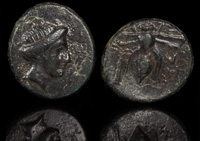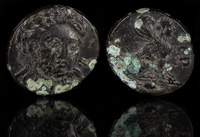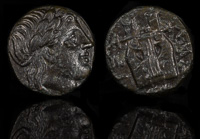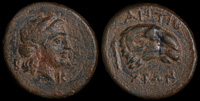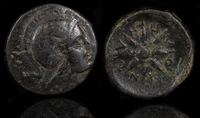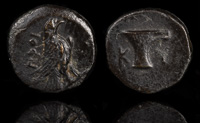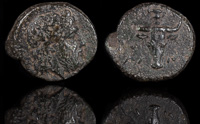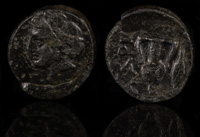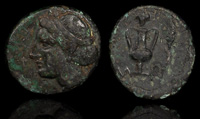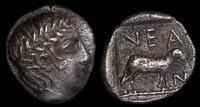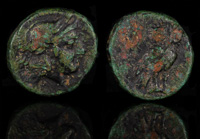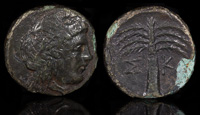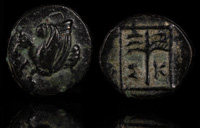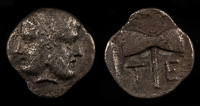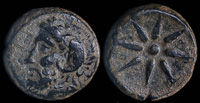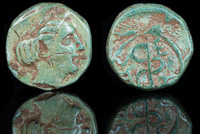Troas
The area around Troy is first settled.
Troy is already a small fortified city.
Troy I destroyed by fire. Troy II is built.
Final destruction of Troy II. Troy III is constructed.
Troy VI is constructed, which may be considered the most powerful Troy.
Dardanos founded in legend by Dardanus, son of Zeus by Elektra.
Reign of Erichthonios in Dardanos.
Troy first appears in Hittite records as ‘Wilusa’.
Tros, from whom the Trojans are named, reigns in Dardanos.
Troy VI is destroyed by what is believed to be an earthquake.
Troy VIIa is destroyed by an enemy attack, perhaps that described in the Iliad.
Troy VIIb heavily damaged by an earthquake.
900 BCE
Assos founded by Aeolian colonists from Lesbos.
Troy VIIB is destroyed by fire.
Greek immigrants begin rebuilding around Troy.
Larissa Phrikonis captured by Lydians, who install Egyptian soldiers.
The Lydian governor Paktyes seeks refuge at Kyme after a failed rebellion against the Persians.
Doric temple to Athena constructed at Assos.
Abydos occupied by Persia.
Xerxes moors the surviving ships of the Greek campaign at Kyme.
The Spartan general Pausanias flees to Kolone.
Antandros joins the Delian League.
Athens detaches Kolone , Ophrynion, and Larissa Ptolemais from Mytilene in punishment for their revolt.
May
Pharnabazos orders ships built at Antandros. At the same time, Syracuse helps Antandros finish its city wall, resulting in citizen privileges for Syracusans there. When the ships are complete, Pharnabazos sails for Kalchedon.
408 BCE
Abydos attacked by Athens but repelled by Pharnabazos.
The 10,000, as described in Xenophon’s Anabasis, travel through Antandros and Adramytteion.
Death of Mania of Dardanos, having been strangled by her son-in-law.
397 BCE
Deryklidas of Sparta supports the Ionian Greeks against the Persians. He besieges Atarneos for eight months until they accept his terms and takes Hamaxitos, Kolonai, and Ilion. This ends in an armistice with Pharnabazos.
Hamaxitos and Larissa-Ptolemais are forcibly re-integrated into the Persian Empire.
Larissa Phrikonis is beseiged by the Spartan general Thibron, who accomplishes nothing.
Xenophon stops in Ophrynion to sacrifice with the 10,000 on the way home.
During a battle between Deryklidas of Sparta and Pharnabazos with Tissaphernes, men from Priene and Achilleion fighting with the Spartans fled. Hamaxitos and Larissa-Ptolemais thus receive their freedom again.
Anaxabios replaces Deryklidas as head of Abydos.
Anaxabios of Abydos is ambushed and killed by the Athenian general Iphikrates.
Peace of Antalkidas, arranged by Artaxerxes II, is signed in Susa, ending the Corinthian War. Abydos, Aigai, Kalchedon, Kaunos, Klazomenai, Kyzikos, Parion, Samos, and Adramytteion become part of the Persian Empire.
Tyrant Philiskos rules Abydos.
Autophradates lay siege to Ariobarzanes in Assos. In exchange for Athenian support, Ariobarzanes gifts them Sestos.
Abydos comes under the tyrant Iphiades.
The inhabitants of Klazomenai and Kyme quarrel over ownership of Leukai, until Klazomenai succeeds.
Aristotle moves to Assos and marries the niece of its ruler Hermeias, Pythia.
Abydos is besieged by Memnon of Rhodes, forcing Parmenion to give up his siege of Pitane.
Alexander the Great crosses from Sestos to Abydos. He then visits Troy and returns to Abydos. On his way, he sacrifices at the tomb of Achilles at Achilleion.
The Persians are driven out of Assos and Ephesos by Alexander the Great.
With the arrival of Alexander the Great, Chares pays respects to him from Sigeion.
The Persian satraps hold council at Zeleia before the Battle of the Granicus.
Autophradates sails against Tenedos, who capitulate to him and the Persians.
Tenedos defects to Alexander III, but is then taken and its walls destroyed by Persia.
Tenedos is taken by Hegelochos, a general under Alexander III.
June 30
Partition of Babylon. Abydos and Adramytteion come under control of Leonnatos. Egypt with Alexandria and Gaza are under Ptolemy. Baktria comes under Seleukos I Nikator. Asandros obtains Caria. Laomedon receives Koele-Syria.
Partition of Triparadisos. Abydos is given to Arrhidaios. Susa goes to Antigenes. Antipater is left in charge of Macedonia and is entrusted with Alexander IV and Philip III. Asandros is confirmed with Caria. Kleitos the White receives Lydia, replacing Menander. Laomedon is confirmed as satrap of Koele-Syria. Peithon is confirmed in Kophen. Seleukos receives Babylon.
The bones of Hector are moved from Ophryneion to Thebes to satisfy an oracle.
Alexandria Troas founded by Antigonos I Monophthalmos from the cities of Neandria, Skepsis, Hamaxitos, Kolone, Kebren, Larissa-Ptolemais, and Achilleion.
A new theater is built at Ilion.
Abydos besieged by Lysimachos.
Lysimachos takes Sigeion by force from Antigonos I Monophthalmos.
Antigoneia renamed to Alexandria Troas by Lysimachos.
Around this time, Lysimachos combined Achilleion with other communities around Ilion.
Arsinoe II begs Lysimachos to let her have Herakleia Pontika. He eventually relents, and she installs Herakleides of Kyme, who becomes tyrant.
Lysimachos defeated at the Battle of Coropedion. Adramytteion, Ainos, and Abydos come under control of the Seleukid Empire. Ephesos returns to its original name.
Kebren is possibly refounded by Antiochos I Soter as Antiocheia.
Larissa Phrikonis is burnt to the ground by Galatian raiders.
Attalos attacks the forces of the usurper Adaios and defeats him, then engages in friendly negotiations with Lampsakos, Alexandria Troas, and Ilion, all of which had remained loyal to him.
Abydos and Ephesos conquered by Ptolemy III of Egypt.
Gauls invade the Troad and besiege Ilion. Alexandria Troas dispatches an army of 4000 and relieves the siege.
Antiochos III, desiring to meet Rome in battle, is detained by the cities of Alexandria Troas, Smyrna, and Lampsakos, which refused entreaties.
Treaty of Apamea. Euromos, Laodikeia ad Lykon, Sestos, and Abydos returned to the Kingdom of Pergamon.
Adramytteion, Smyrna, Sestos, Synnada, Philadelphia, Laodikeia ad Lykon, Attalaia, Erythrai, Ephesos, Perge, and Assos come under Roman control after Attalos III, the last Attalid king, leaves it to Rome in his will.
Ilion is destroyed by Sulla.
Ilion suffers an attack by pirates.
Ilion sides with the Roman general Lucullus against Mithridates VI.
Pompey rewards Ilion for its loyalty.
Julius Caesar bestows benefactions on Ilion.
Assos is visited by the Apostle Paul.
Emperor Caracalla holds funeral games at the Tomb of Achilles at Achilleion on his way to Parthia.


